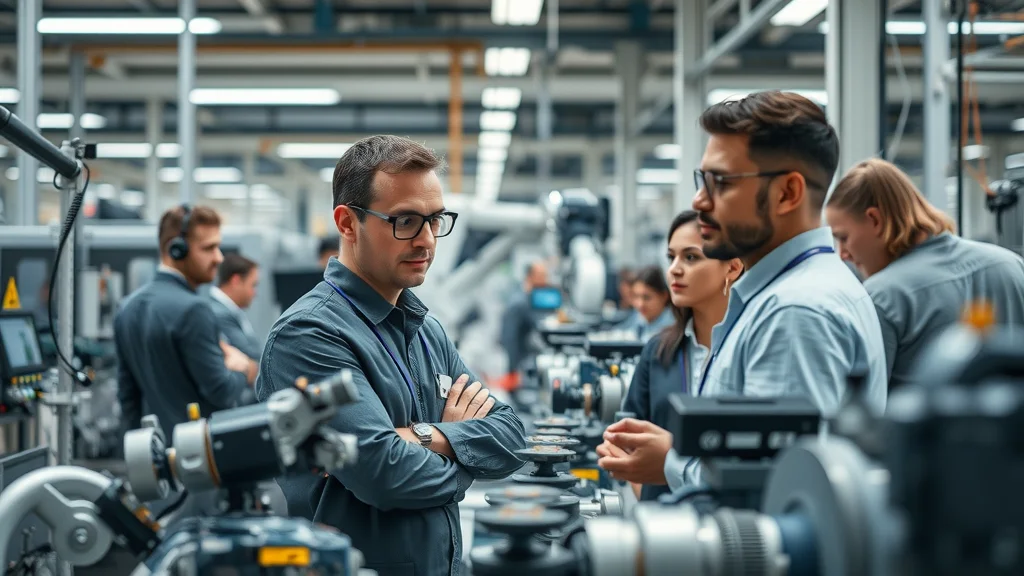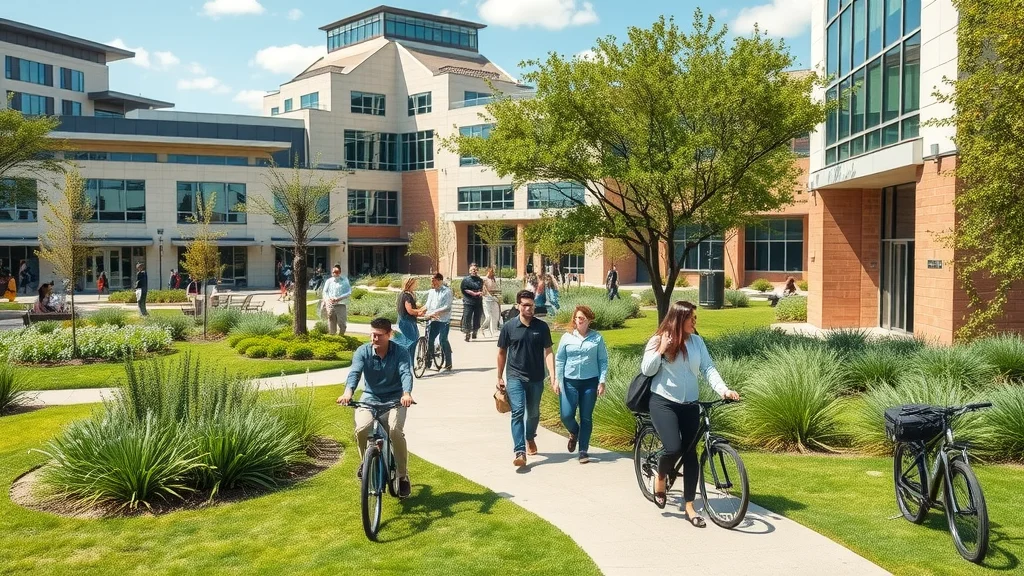Did you know the Austin metro area’s population exploded by over 30% from 2010 to 2023? This stunning growth isn’t just a number—it’s a reflection of how Austin has become a magnet for talent, innovation, and economic energy. From skyrocketing tech companies to world-class hospitals and the renowned University of Texas, the region’s major industries and employers in Austin are fueling a boom unlike any other U.S. city. In this comprehensive guide, we’ll pull back the curtain on the most influential sectors, the powerhouse employers, and the surprising players making Austin a model metropolis for the future.
Austin Metro Area at a Glance: Unveiling Surprising Growth Statistics
The Austin metro area’s ascension has been both rapid and strategic. More than just Texas’s capital, Austin has transformed into a diverse economic engine. The city routinely outpaces national averages in job and population growth, and its GDP is among the fastest-growing in the nation. The austin metro area—which encompasses dynamic communities from Round Rock to Central Texas—has attracted waves of newcomers chasing opportunity, lifestyle, and world-class amenities. This blend of creative energy and business savvy has driven Austin’s reputation as a hotspot for both new ventures and major relocations.
As major employers invest and expand here, Austin’s job market has become fiercely competitive in sectors ranging from high-tech to healthcare and education. The city stands out for its favorable business climate, deep pool of skilled workers, and a quality of life that draws both companies and individuals looking to move to Austin. As we examine the key statistics below, it’s clear that the major industries and employers in Austin have reshaped the metropolitan landscape, creating unprecedented economic growth and resilience.
"Between 2010 and 2023, the Austin metro area’s population grew by over 30%, fueling the city's rise as an economic powerhouse." — Austin Business Journal
Key Metro Area Growth Metrics | |||
Metric |
2010 |
2023 |
% Change |
|---|---|---|---|
Population |
1.73 million |
2.26 million |
+30.6% |
Job Growth |
850,000 |
1,180,000 |
+38.8% |
Gross Domestic Product (GDP) (Billions) |
$86B |
$158B |
+83.7% |

What You'll Learn
The dominant key industries shaping the Austin metro
Names and roles of the largest employers in Austin
Emerging sectors fueling future growth
Surprising companies with major footprints in the Austin area
Top 7 Major Industries in the Austin Metro Area: Where Opportunity Thrives
The Austin metro area is a tapestry of innovation and economic diversity. At the heart of this ecosystem are seven key industries that blend tradition and breakthrough ideas, sustaining Austin’s reputation as a city of opportunity. The significance of these sectors is seen not only in the high number of jobs but also in their power to attract new investment and talent from around the globe. Whether you’re a seasoned professional or just getting ready to search jobs in Austin, understanding what drives this city is crucial. Let’s dive into the major industries and employers in Austin and explore what makes each sector so pivotal for the region’s continued prosperity.
In the following sections, we’ll break down the leading players, the latest statistics, and the dynamic role each industry has in shaping Central Texas. From groundbreaking tech companies to the ever-growing life sciences field and beyond, each industry’s influence extends deep into Austin’s culture, workforce, and future potential. The combination of economic growth, a supportive austin chamber of commerce, and an influx of creative talent means that opportunity is abundant for employees in Austin at every stage of their careers.
Austin’s creative sector, in particular, has played a unique role in shaping the city’s identity and economic landscape. For a closer look at how the arts and music scene continues to influence Austin’s growth, discover the story behind Brian Eno and Beatie Wolfe’s collaborative albums and their impact on the local creative community.
1. Technology Sector: The Powerhouse of Major Industries and Employers in Austin
Leading tech companies and unicorn startups
Why Austin is known as ‘Silicon Hills’
Statistics: workforce size, average salaries

The technology sector stands atop the list of major industries and employers in Austin, powering the city’s evolution into a modern tech hub. The arrival and growth of heavyweight companies like Apple, Dell Technologies, Google, Meta, and Oracle have cemented Austin’s status as ‘Silicon Hills,’ rivaling tech industry hotbeds such as Silicon Valley and Seattle. The thriving innovation ecosystem, backed by unicorn startups and a deep pool of software companies, has turbocharged job creation for engineers, analysts, designers, and tech support professionals. Statistics from the Austin Chamber of Commerce show that over 180,000 employees work in the area’s tech sector, with salaries well above the metro average—often exceeding $110,000 annually for STEM roles.
Austin’s blend of research institutions, venture capital, and community spirit continues to entice both established tech giants and fledgling startups. Many professionals move to Austin for the robust job market, unique workplace culture, and access to innovation clusters. Major employers such as Dell Technologies (headquartered in Round Rock), IBM, and Samsung add to the region’s pull, further establishing the city as one of the most influential tech centers in North America. "Austin’s tech industry now rivals legacy strongholds like Silicon Valley and Seattle in key metrics." — Austin Business Journal
2. Education & Research: University of Texas and More as Major Employers in Austin
University of Texas: largest employer status
Impact on Austin metro area innovation
Top higher education campuses: UT Austin, Texas State University (Round Rock campus), Austin Community College
The educational sector is a bedrock of the Austin metro area’s growth and innovation. Leading the pack is the renowned University of Texas at Austin (UT Austin), consistently ranked as the area’s largest employer, with over 24,000 employees. The state flagship campus doesn’t just provide jobs; it also catalyzes entrepreneurship, fosters groundbreaking research, and injects billions into the austin metro area economy annually. UT Austin’s research facilities and partnerships with tech companies and life sciences firms create a ripple effect, leading to jobs, startups, and robust collaboration with the local business community.
Alongside UT Austin, other institutions—like Texas State University in Round Rock and Austin Community College—contribute skilled graduates and are vital to Central Texas’s workforce pipeline. These schools support a continuous inflow of talent for local employers in Austin and power innovation in key industries that range from software and hardware development to healthcare and advanced manufacturing. Educational institutions are woven into the fabric of the area, linking research, real estate, and culture. The combined economic impact and job creation from this sector make it a cornerstone for Austin’s present and future.
3. Healthcare: Family of Hospitals as Key Players in the Austin Area
Notable systems: St. David’s, Ascension Seton
Role in driving Austin metro area jobs
Healthcare’s economic impact

Healthcare is an indispensable pillar among major industries and employers in Austin. The family of hospitals, including heavyweights like St. David’s HealthCare and Ascension Seton, anchors thousands of jobs and provides high-level care for a region whose demands grow alongside its population. These health systems aren’t just among the top largest employers in Austin; they’re economic engines, supporting allied health, administrative, and professional roles that ripple throughout the austin metro area. Together, Ascension Seton and St. David’s employ well over 15,000 people locally, while associated clinics and specialty centers boost the sector’s regional footprint.
Beyond employment, healthcare’s influence is seen in infrastructure expansion, research partnerships with UT Austin and other universities, and a growing life sciences cluster—placing Austin squarely on the national map for biotech and pharmaceutical innovation. The increased focus on new procedures, telemedicine, and medical technology means this sector is positioned for sustained growth, offering career mobility and the prospect of future breakthroughs for employees in Austin.
4. Government Services: Anchoring the Austin Business Community
State of Texas offices as top employers in Austin
Scope of government employment across the austin metro
Government services provide stability and scale like no other sector in the Austin metro area. Austin’s unique role as the Texas state capital translates to thousands of local employees working in government agencies, from the State Comptroller and Department of Transportation to education and health departments. The State of Texas is consistently the single largest employer in the Austin metro, supporting policy, enforcement, administration, and vital public services.
In addition to state offices, local entities like the City of Austin and the Austin Independent School District bolster employment, ensuring diverse job avenues for educators, planners, emergency responders, and administrative staff. This sector’s steady jobs and benefits make it essential, especially during economic cycles when private industries may fluctuate. Its reach into real estate, local business contracts, and civic infrastructure also shapes the broader Austin business ecosystem.
5. Advanced Manufacturing: Growing Influence in Major Industries and Employers in Austin
Notable manufacturers: Tesla, Samsung
Recent job creation statistics

Advanced manufacturing is rapidly gaining momentum among the major industries and employers in Austin, with new investments redefining what was once a service-dominated landscape. The arrival of Tesla’s Gigafactory and Samsung Austin Semiconductor have collectively created tens of thousands of local employees, driving economic vitality throughout the metro area. These manufacturers employ engineers, skilled tradespeople, logistics experts, and a growing number of automation specialists, making the sector a key partner in Austin’s economic diversity.
What sets Austin’s advanced manufacturing apart is its integration with the city’s hardware and software companies, as well as collaborative efforts involving the Austin Chamber and regional tech alliances. The sector’s increasing need for qualified workers is refueling workforce development pipelines and supporting growth in related sectors like life sciences and green technology. This synergy solidifies advanced manufacturing’s reputation as a bedrock for high-quality jobs and long-term regional growth.
6. Creative & Entertainment Industries in the Austin Business Scene
Film, music, and events shaping culture
Economic contribution to austin metro area

The creative and entertainment sector is intrinsic to Austin’s identity as the “Live Music Capital of the World.” Iconic events like South by Southwest (SXSW) and Austin City Limits aren’t just cultural mainstays—they’re also massive economic drivers that generate jobs in production, hospitality, and media. In the austin metro area, this sector encompasses everything from independent film studios and gaming companies to large-scale event planners and dynamic advertising agencies.
Music venues, art galleries, and media studios are scattered throughout downtown and the greater Austin area, drawing both international talent and homegrown creatives. The sector’s economic impact is significant, adding billions to the local economy and making it a critical complement to high-tech and traditional business sectors. Creative industries support real estate, food service, and local retail, while sustaining Austin’s global reputation for innovation and artistic excellence.
7. Financial & Professional Services: Major Employers in Austin Metro
Key companies and job trends
Growth in the financial tech sector
Financial and professional services—covering banking, investment, law, consulting, and accounting—round out the major industries and employers in Austin. The growth of fintech firms and regional banking headquarters has created new avenues for employment in the Austin metro area. Key companies such as Charles Schwab, Visa, and a steady influx of national consulting giants are increasingly selecting Austin for their southern operations. These companies employ everyone from analysts and risk managers to legal professionals and software developers.
The state’s business-friendly policies, access to a highly educated workforce, and the integration of advanced software company solutions are significant factors behind this sector’s expansion. In addition, Austin’s reputation for innovation and its robust start-up ecosystem encourage continuous growth. As new trends—such as digital banking, payment technologies, and remote work—reshape the service landscape, Austin’s financial and professional service employers are adapting rapidly, further enhancing economic resilience and career options for employees in Austin.
The Largest Employers in Austin Metro: Company Spotlights
Understanding who the largest employers in the Austin metro area are is essential for anyone planning to search jobs or explore new business opportunities locally. This region’s powerhouse employers are clustered in the tech, healthcare, education, government, and advanced manufacturing sectors. Below you’ll find a snapshot of major employers, spanning global tech icons, leading hospitals, top educational institutions, and essential government agencies. These organizations shape Austin’s workforce, fuel the metro area’s economic growth, and contribute enormously to the region’s thriving business environment.
Many of these companies have expanded rapidly due to Austin’s advantageous business climate, supportive chamber of commerce, and the wealth of local talent. The following table highlights the most influential organizations, their industries, and the number of local employees that ensure Austin’s ongoing growth.
2024 List of Largest Employers in Austin Metro Area | ||
Company |
Industry |
Local Employees |
|---|---|---|
State of Texas |
Government |
68,000 |
University of Texas at Austin |
Education/Research |
24,300 |
Dell Technologies |
Technology |
13,000 |
Ascension Seton |
Healthcare |
10,100 |
St. David's HealthCare |
Healthcare |
9,100 |
Apple Inc. |
Technology |
8,800 |
Samsung Austin Semiconductor |
Manufacturing |
6,000 |
Austin Independent School District |
Education |
6,000 |
State of Texas
University of Texas at Austin
Dell Technologies
Ascension Seton
St. David's HealthCare
Apple Inc.
Samsung Austin Semiconductor
Austin Independent School District
"From global tech giants to world-class hospitals, Austin’s largest employers fuel both economic growth and community development."

(Video description: Animated explainer covering the rise of Austin’s biggest employers, their impact on the job market, and contributions to the region’s economic resilience and innovation. Features insights on local employees, sector growth, and what makes Austin a talent magnet.)
People Also Ask: Major Industries and Employers in Austin
Who are the major employers in the Austin area?
Overview: Top 5 largest employers in Austin metro area
Industries represented by these companies
The top five major employers in the Austin area reflect the diversity of the city’s booming economy. State of Texas leads with tens of thousands of government employees. UT Austin anchors higher education and research as both a world-class university and a major regional employer. Dell Technologies sits at the core of the metro’s high-tech scene, followed by healthcare powerhouses Ascension Seton and St. David’s HealthCare. Together, these organizations span the fields of government, education, technology, and healthcare, supporting steady job growth for local employees and shaping Central Texas’s labor market. Other largest employers in Austin, such as Apple and Samsung, cement the area as a global business destination.
What is the main industry in Austin, Texas?
Analysis of key industries and their dominance
Historical trends in Austin business sectors
While Austin boasts a vibrant and diverse business environment, technology is widely recognized as the main industry driving growth and innovation in the Austin metro area. The city’s nickname, “Silicon Hills,” reflects the dominant presence of software companies, tech manufacturers, and startups, all supported by an entrepreneurial spirit and a top-tier skilled workforce. Historically, government and education were foundational, but recent decades have seen tech, healthcare, advanced manufacturing, and creative sectors explode, diversifying the key industries and reinforcing Austin as a top relocation choice for companies and job seekers alike.
What companies have offices in Austin, TX?
List: Major international and national companies with Austin offices
Reasons companies choose the Austin business environment
Austin’s attractive business climate, lifestyle perks, and abundance of skilled workers have drawn a myriad of major companies to open offices in the metro area. Leading names include Apple, Google, Meta, Amazon, Dell Technologies, IBM, Oracle, Samsung, Tesla, Visa, Charles Schwab, and Indeed. Many of these organizations cite the city’s quality of life, collaborative austin business ecosystem, and forward-thinking chamber of commerce as deciding factors. The robust infrastructure, housing options, and cultural appeal make it an ideal place for expansion, both for established players and up-and-coming firms seeking innovation-friendly roots.
What is Dirty 6 in Austin?
Brief explanation: Dirty Sixth street's role in Austin area's culture and economy
“Dirty 6” refers to the most famous section of Sixth Street in downtown Austin, renowned for its eclectic nightlife, live music venues, and food scene. While not an industry per se, Dirty 6 is a critical part of the local culture and hospitality economy. It attracts thousands of tourists and locals year-round, providing significant jobs in entertainment, food service, and retail. The vibrant activity on Dirty Sixth reflects Austin’s broader creative and entrepreneurial spirit, making it a key landmark and symbol of the city’s energetic lifestyle.
FAQs on Major Industries and Employers in Austin
What upcoming industries are expected to grow in the Austin metro area?
In addition to established sectors, life sciences, clean tech, and advanced manufacturing are projected to see significant growth. New investments in biotech, renewable energy, and medical research continue to foster innovation, create jobs, and attract new business to the region.
How has remote work impacted Austin's major employers?
Remote work trends have reshaped recruitment and real estate within Austin. Tech companies, consulting firms, and professional service providers have adopted hybrid models, expanding hiring reach and allowing employees to work from anywhere. This shift has made Austin even more attractive for top talent seeking flexibility.
Which sectors employ the most people in the Austin metro?
The largest sectors by employment include government, education, healthcare, and technology. Government offices, local school districts, hospital networks, and leading tech firms together anchor the job market, supported by ongoing growth in advanced manufacturing and creative industries.
Key Takeaways: Understanding Major Industries and Employers in Austin
Tech, education, and healthcare are the largest sectors
The Austin metro area's rapid growth is driven by high-value employers
Economic diversity continues to attract new businesses and talent
Discover Major Industries and Employers in Austin: Explore Opportunities Now
Whether you’re considering a move to Austin, planning to search jobs, or curious about this vibrant region’s growth, understanding the major industries and employers in Austin gives you a front-row seat to one of America’s most dynamic economic stories. Now is the time to explore all that Austin has to offer—from tech giants to creative pioneers and beyond.
Ready to search jobs, grow your career, or invest in Austin's future? Start exploring opportunities in the Austin metro area today.
As you continue to explore Austin’s thriving industries and top employers, consider how the city’s creative pulse shapes its broader economic landscape. From innovative tech startups to world-renowned musicians and artists, Austin’s unique blend of business and culture offers endless opportunities for growth and inspiration. If you’re interested in how the arts are fueling new waves of innovation and community engagement, take a deeper dive into the artistic revolution led by Brian Eno and Beatie Wolfe’s latest collaborative albums. Their work is just one example of how creativity and industry intersect in Austin, opening doors for both career advancement and cultural enrichment.
 Add Element
Add Element  Add Row
Add Row 



Write A Comment